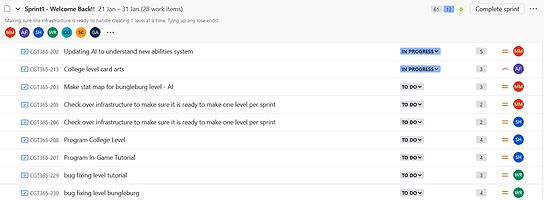Game Prodution
Game production is a beast, coordinating a team of creatives to adhere to schedules and meet deadlines is not an easy task. In my opinion, understanding your team and establishing effective organizational and communication systems is crucial for ensuring a smooth production workflow.
Organization
Starting with pre-production, there are a few critical elements a game studio needs: an organizational system, a
game design document (GDD), and defined milestones. For organization I use:
-
Confluence: This is where all our major production documents live, including:
-
Game Design Document
-
Art Design Document
-
Coding Structure Document
-
Audio Design Documents
-
Meeting Notes
-
-
Jira: This tool is used to organize our sprints.
-
Tasks are assigned as issues and story points.
-
Sprints start and end on a bi-weekly basis.
-
-
Google Drive: This is where all assets live, along with less strict documents and anything that can't be housed
in the confluence -
Discord: main communication hub, focused channels include:
-
Announcements
-
Programming
-
Art
-
Design
-
Off-Topic
-


Contracts
For our game Sillypolitik, we wanted to ensure that every team member was aligned on expectations, responsibilities, and standards. To achieve this, we created a team contract. I drafted the initial version and collaborated with our team lead to refine it, incorporating requested changes and additions. Once finalized, I made sure that everyone was comfortable with the terms before we proceeded with signing.
The contract outlined key areas such as:
-
Scope of Work
-
Project Requirements
-
Aesthetic and Usability Guidelines
-
Game Features
-
Addressing Missed Deadlines
-
Managing Workload Imbalances
-
Employee Termination Policies
-
Financial Considerations
This contract became a vital tool in keeping the project on track, establishing a shared standard for accountability, and fostering a clear code of conduct within the team!

A photo of our fractal booth
Milestones
Before the second semester of the project began, I put together a rough outline detailing our team's goals for the semester. The plan centered on developing a new level every two weeks, incorporating programming, art, music, and sound effects. By mid-March, we aimed to have all new content completed, allowing us about a month for bug fixes, asset creation (whether art or music), polishing, and last-minute quality-of-life improvements before Fractal.
Now that almost everything is set up, it's time to make a game!
Fractal is Purdue University's annual showcase highlighting projects and creative work from CGT students. Our primary goal was to ensure the game was complete and ready for this event.
We successfully presented a fully playable version at our Fractal booth. While the game required a few live service updates to address bugs and enhance the user experience, we were thrilled to win the Fan Favorite Award!

Communication
Once we hit the ground running, it's important to ensure the team is productive and feels good about their work!
Effective communication can take several forms:
-
All-Hands Meetings:
-
We go over an agenda and discuss any important matters that the whole group needs to hear.
-
-
Individual Check-Ins:
-
These can take the form of one-on-one meetings during class or individual messages to check in with each team member.
-
-
Announcements in Discord:
-
Used for sharing any important information that team members need to know immediately.
-
With communication in place, we can now focus on the day-to-day process of keeping the game on track.
The Day to Day
During the week, there is a lot to get done, so I always ensure to hit these marks:
-
Check in with the team lead
-
Conduct individual check-ins (in class and on Discord)
-
Update meeting notes
-
Update the Jira backlog
-
Start or Make the next sprint
-
Discuss current and future sprint tasks
-
Make sure everyone is on the same page
-
Be a rubber duck
-
Listen and help problem solve any issues
-
Daily Tasks
On a daily basis, I:
-
Check Jira for updates and progress
-
Check Discord and respond to messages
-
Check Brightspace (class hub) for any updates
By consistently hitting these marks throughout the week and staying on top of daily tasks, I ensure the team remains aligned and productive, driving the project forward effectively.

Any Thing Else?
Things pop up all the time, from in-class presentations to paperwork. I always make myself available for all classwork that can be considered group work. Since these tasks don't happen regularly, I wouldn't count them in the day-to-day or week-to-week activities. Here are some of the miscellaneous tasks I handled as a producer:
-
Created a document outlining each sprint's goals by department
-
Developed the presentations
-
Managed social media with the help of our Team Lead
Overall, being a producer is an incredibly rewarding experience. I cherish all the small moments, like seeing a programmer's eyes light up when they squash a bug, witnessing the art evolve from the white box stage to the final vision, and feeling the enthusiasm and passion each team member has for making games. I couldn't be a producer without them, and supporting them is my favorite part of the job. Organization takes a close second!
